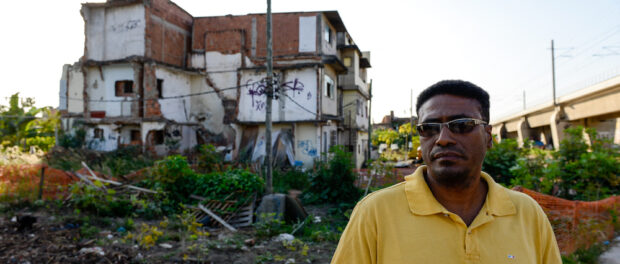
Seven years have passed since over 1,000 families from the Beira Rio community in Manguinhos in the North Zone of Rio de Janeiro were evicted due to Growth Acceleration Program (PAC) projects that were supposed to provide basic urban services to the favela complex. Since 2014, when RioOnWatch last documented the continuing struggle of the remaining ten families that have resisted evictions and their hopes for the site, one thing is clear: little has changed.
Although a road now exists in the space where some of the evicted houses once stood, it has not been opened for regular use despite its completion over a year ago. In fact the entire site where the 1000 homes once stood has not been put to any use at all after these seven years. This state of incompletion and public sector neglect is a continual theme for the ten families who have resisted eviction and are waiting for the state to provide just compensation for their homes.
Vanderson José Martins Guimarães, who, along with his wife and two daughters, makes up one of the remaining families, highlights the often manipulative tactics of the government to pressure them into leaving. For example, the government might shut off the electricity or water supply on a Friday and wait until the following Monday to “fix” it, leaving residents without service for the weekend.
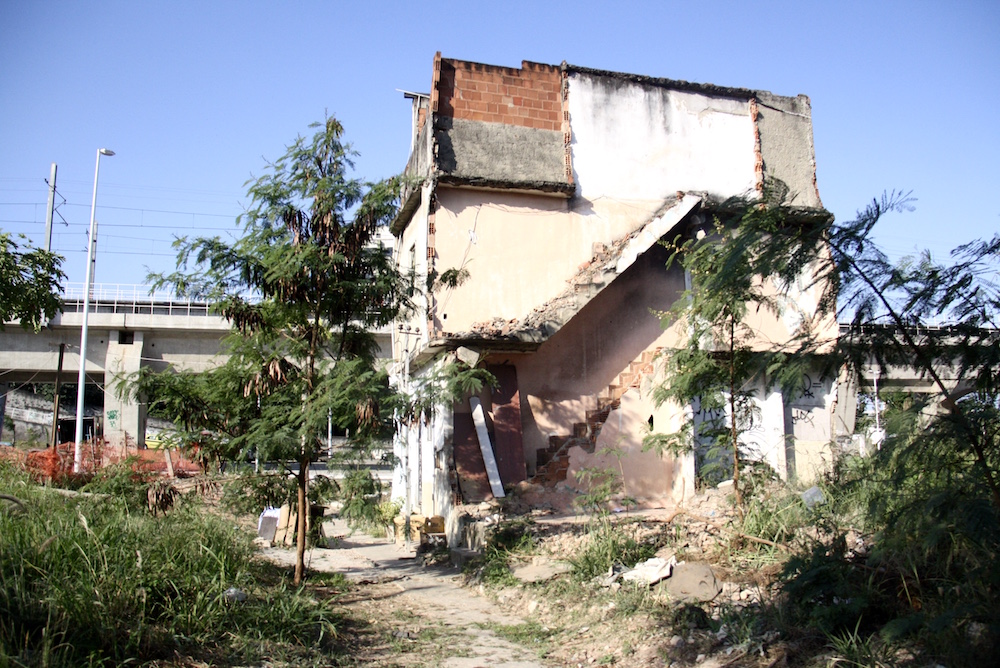
Other issues facing residents include a lack of public lighting and security. Vanderson notes that the public lighting actually works, but is rarely turned on, leaving this area of the community at risk for criminal activity. The darkness, combined with secluded areas underneath the train lines and the remaining houses’ physical separation from the rest of the Manguinhos complex, leaves these homes even more isolated. The remaining residents note that “security enforcement does not exist.” Although Manguinhos has a Pacifying Police Unit (UPP), they rarely pass by this part of the community, forcing residents to be on constant alert.
“For me, there’s one word for our situation: precarious,” Vanderson says, adding that the community feels completely abandoned.
Meanwhile, the road behind the remaining houses, which parallels the river running along the community, has become an informal trash dump. For several blocks, the road winds along mountains of garbage that reach over six feet tall in some spots, much of it debris left behind from the demolition of the houses. Residents say that people and businesses from nearby neighborhoods take advantage of the area’s state of abandonment to dump their trash, alleging that they’ve even seen trucks from medical facilities leaving potentially hazardous waste behind.
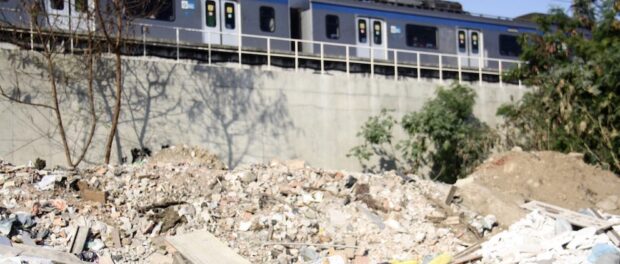
According to Vanderson, some people also burn the trash, adding to the risk of other health problems for those living by the road. Several children in the community suffer recurring respiratory illnesses. On a sunny Saturday afternoon, several parts of the trash piles were visibly smoldering, and the odor of burning garbage drifted through the air over the river.
Residents say the city government knows about this health and safety risk, but has done little to solve the problem, sometimes just pushing the trash back into bigger piles without removing any of it. Vanderson and another member of the resisting group, Vanderley Pereira da Silva, recall one of the two occasions when the city government cleaned up the road–only after a Globo news helicopter filmed the trash that had piled up nearly to the height of the raised train tracks.
“The next day, they came and cleaned it all up,” says Vanderson. “After one week, the mountains of trash were back.” Since then, he says, there has been no further news coverage, and no more visits from the garbage trucks.
Residents believe the state knows exactly what it is doing. They say officials know they have the power to do what they want, and use it to take advantage of residents who are at the will of the state.
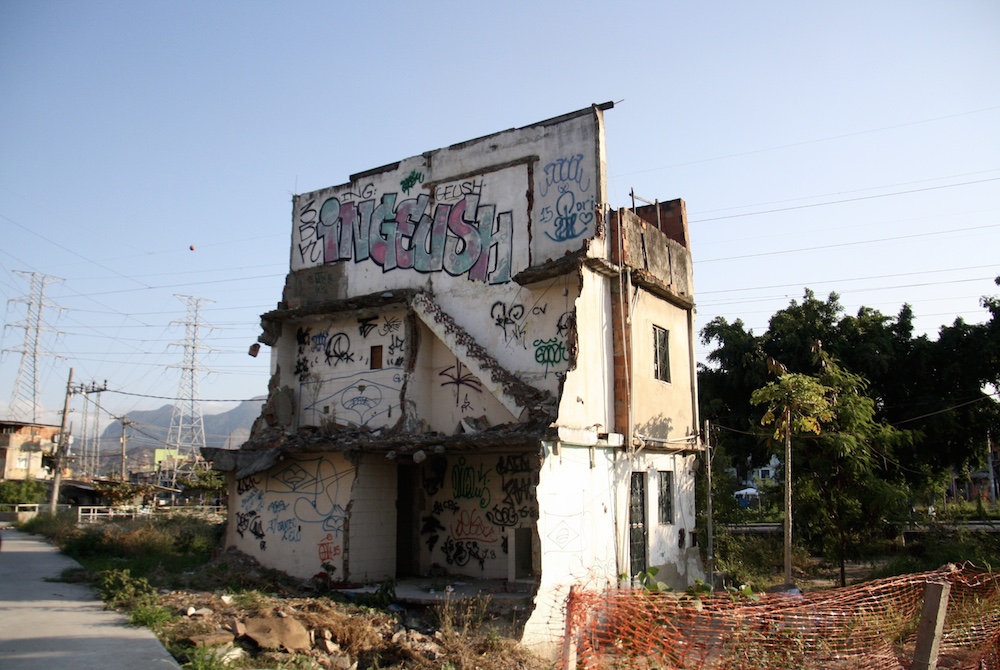
“Sometimes you were not able to enter your house. They would shut off access to your house and open it whenever they wanted. This was practically every day,” says Vanderley.
For those who were removed, conditions are not necessarily any better. Many families have had to move further away from their jobs and their children’s schools, and a large number have struggled with their new financial situation in apartments that were described as “trash.” Some did not know how to manage the sudden influx of cash from the sale of their home, while others who had never paid rent or utility bills before faced an unexpected set of new expenses. Further, the bankrupt state government is unable to pay the social rent they promised the evicted residents, leaving them without their original homes and without financial support.
“Of [the nearly 1000] families that left, maybe eight of them are better off now,” says Vanderson.
“Some of them moved to the other side of the river inside Manguinhos. Others that were here went to Campo Grande [in the far West Zone] or the Baixada Fluminense [municipalities North of Rio], but very few were able to stay in the same area,” says Vanderley, citing the low compensation rates and rising home prices because of real estate speculation as the main cause of this de facto expulsion.
“It was better for everyone before,” agrees Denis de Souza, 56, another of the remaining residents, who has lived in the community for almost 40 years.
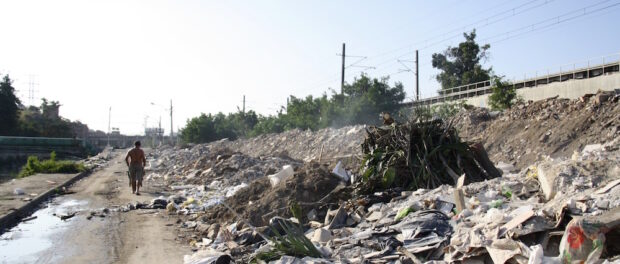
The “one good thing” that has come from the interim years of resistance, according to Vanderson, is the hope that the remaining families are likely to receive greater compensation for their homes and properties–if the convoluted legal process ever arrives at any kind of conclusion. Families that accepted the state government’s original offers received as little as R$6,000 for their homes, while those who held out were able to negotiate higher sale prices, up to R$30,000 or $40,000.
With property values on the rise throughout Manguinhos, the remaining families should stand to receive even more, if the government complies with the Municipal Organic Law requiring compensation that would permit families to relocate within a one kilometer radius of their original residence.
Vanderson highlights the growing appeal of the centrally-located neighborhood, which has access to a nearby metro station, a SuperVia train station, Avenida Brasil highway, four community daycares, a health post, and large shopping malls like the Nova America and North Shopping, making it increasingly attractive to potential developers.
“In 20 years, [the value of real estate in this area] will be sky-high,” he predicts.
The compensation, however, would depend on the state government and judicial system responding to residents, which seems increasingly improbable as the years go by and residents’ quality of life continues to suffer. The political turmoil within the state government and declared financial “state of calamity” make it even less likely that residents will receive any conclusive response from officials.
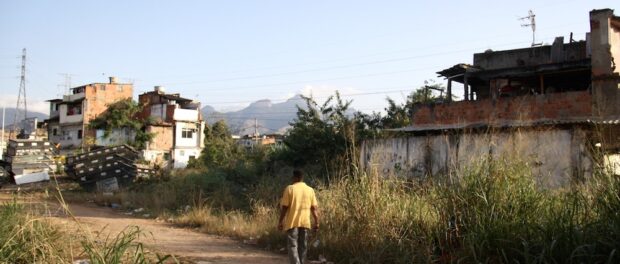
The residents are critical of the impending Olympic Games, which they believe will be another opportunity for the government to put “make-up” on the situation in the city.
“I don’t believe they will pay social rent, but they will probably pay a good part to people so they don’t have protests during the Olympics,” Vanderson believes. After the Olympics, the two say that “absolutely, the situation will get worse.”
Communication with the state has already “closed,” says Vanderson. “They don’t want to talk to us anymore.”
“After what has happened, you can’t expect anything from those people,” says Denis.
At this point, they say, they can do little more than hope for a “miracle,” though Vanderson and Vanderley laugh at the idea that any such miracle will come. With the coming mayoral elections in October, the residents are also dismayed that they still do not know who their options for mayor will be.
“It’s the same story as always. After all these years of waiting, I don’t expect anything good,” says Vanderson.
